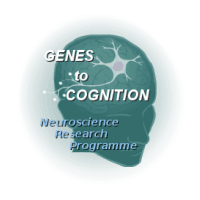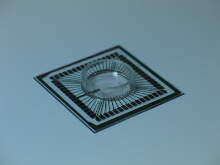G2C::Electrophysiology::Cultured Neuron
In the cell electrophysiology team, we use multi-electrode arrays (MEAs) to record the electrical activity of neuronal networks growing on top of a grid of electrodes. On these devices, we grow neurons derived from mice lacking specific synaptic molecules to study how these alterations affect the function of networks of interconnected neurons.
The electrodes detect spontaneous action potentials passing along the neuronal processes as neurons communicate with one another. Because the electrodes are housed within the dish that the neurons are growing in, we can take multiple recordings from the same neurons as they develop in culture. This way, we can monitor how patterns of activity between neurons develop over time.
By recording from 60 electrodes simultaneously, MEAs allow us to measure the level of activity in a large neuronal network. An increasing number of the electrodes begin to detect increasing numbers of action potentials as the cultures grow older (Valor et al., 2007). MEAs also enable us to detect changes in the pattern of the activity such as the degree of correlation between neurons at disctinct locations on the array. For example, action potentials are more clustered into synchronous bursts in more mature cultures, as illustrated in this quicktime movie
We have multiplexed the equipment used to record from the MEAs to create a platform for high throughput analysis of mouse mutants generated by G2C. Data generated from this project is available in G2Cdb. Alongside these investigations, we can also study the responses of in vitro neuronal networks to a variety of manipulations, such as the application of drugs, small interfering RNAs or electrical stimuli.
Phenotyping Protocols
| Protocol | Description | View |
|---|---|---|
| P00000012 | Cell electrophysiology of dissociated embryonic hippocampal neurons | View |



